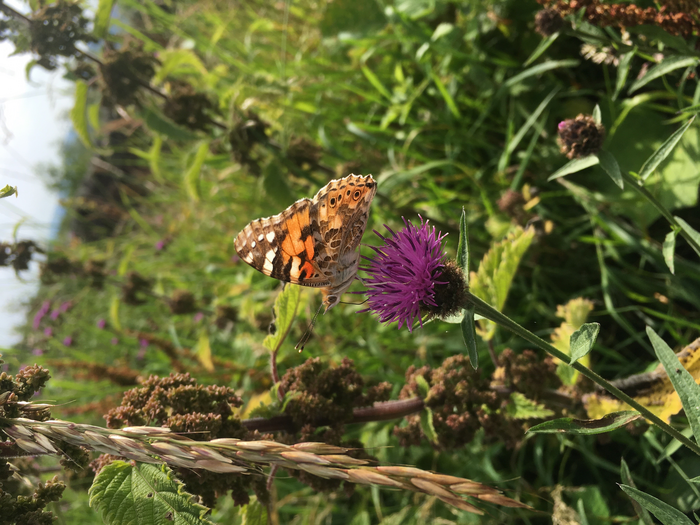Reviewed by Mila PereraOct 26 2022
Experts argue that humans should stop thinking of insects as creepy crawlies and instead concentrate on the enormous benefits they provide to humanity and the natural world.

Painted lady butterfly (Vanessa cardui) on knapweed. Image Credit: Dr. Philip Donkersley
The extensive and deeply embedded cultural view of insects as creepy crawlies is a major impediment to the public's understanding of the role they perform in ecosystems. Researchers suggest that this view is reflected in government biodiversity policy inaction worldwide.
This is one of many initiatives outlined in a recent publication published in Ecology and Evolution by an international team of entomologists that provides a “battle plan” for preventing further insect losses worldwide.
The study, headed by Dr. Philip Donkersley of Lancaster University and co-authored by scientists at the University of Hong Kong, the Czech Academy of Sciences, and Harper Adams University, is a request for action for other entomologists to increase insect advocacy.
Despite 30 years of intergovernmental studies emphasizing biodiversity targets, worldwide insect abundance, biomass, and diversity are declining. The report examines the lack of advancement in insect protection and why substantial change has not occurred.
Biodiversity, including insect, declines are often unintended consequences of human activities with human wellbeing nearly always trumping nature conservation, and this is likely to continue until we reach a point where we see flat-lining ecosystems are detrimental to our own species.
Dr. Philip Donkersley, Lancaster University
Dr. Philip Donkersley adds, “Intergovernmental action has been slow to respond, kicking in only when change becomes impossible to ignore. If we are to see political attitudes and actions change then first societies’ perception of insects needs to be addressed.”
The article presents a variety of benefits provided by insects, including some that are less well-known. These advantages include vital roles within ecosystems through interactions with plants, such as food for other animals, pollinators, and food for humans in several parts of the world.
Other advantages emphasized by the authors include insects’ contributions to well-being, cultures, and innovation, like the entertainment provided by watching butterflies in parks and gardens, their inclusion in poetry and literature, and their inspiration for several technologies, cosmetics, and pharmaceuticals.
In their action plan, the scientists have outlined critical priorities to aid insect conservation. These include:
- Proactively and openly approach government inaction
- Emphasize the technological advances that humans owe to insects and stress that there is still much to be discovered
- Collaborate with bird, plant, and mammal conservation groups to demonstrate species interdependence and the knock-on advantages insect conservation has for other animals
- Engage the public and school students in the wonders of the insect world to overcome perceptions of insects as intimidating “creepy crawlies.”
The benefits we gain from the insect world are broad, yet aversion of phobias of invertebrates are common and stand firmly in the path of their conservation. We need to move beyond this mindset and appreciate the huge role they play in ecosystems, food chains, mental health, and even technological innovation.
Dr. Philip Donkersley, Lancaster University
Dr. Philip Donkersley adds, “This perception change is a crucial step, alongside other measures we outline in this paper. Immediate and substantial actions are needed to protect insect species in order to maintain global ecosystem stability.”
Dr. Philip Donkersley, Lancaster University, Dr. Louise Ashton, University of Hong Kong, Dr. Greg Lamarre, Czech Academy of Sciences, and Dr. Simon Segar, Harper Adams University, also contributed to the study.
Journal Reference
Donkersley, P., et al. (2022) Global insect decline is the result of wilful political failure: A battle plan for entomology. Ecology and Evolution. doi.org/10.1002/ece3.9417.